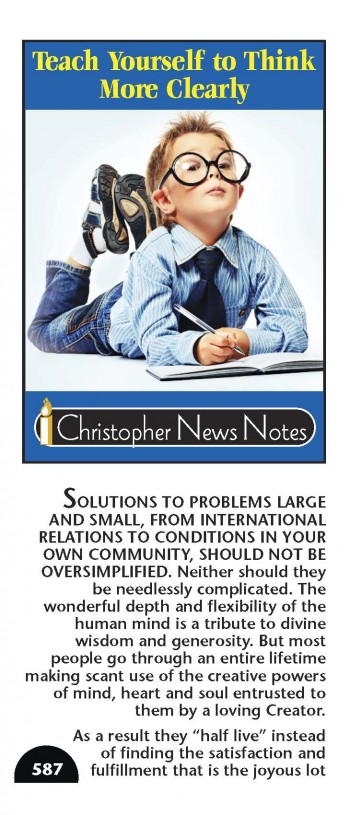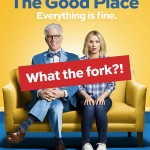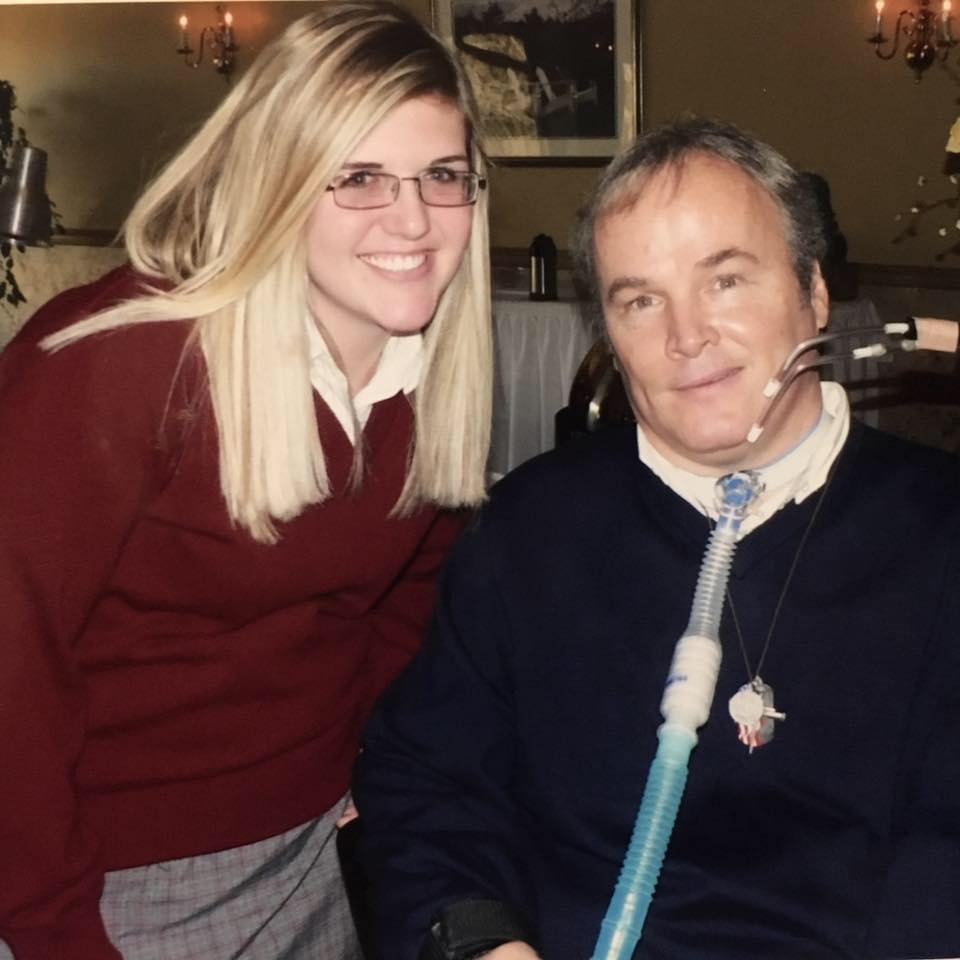 (The following is the text of the Christopher News Note “Teach Yourself to Think More Clearly.” If you’d like a pdf or hard copy, see the end of this post.)
(The following is the text of the Christopher News Note “Teach Yourself to Think More Clearly.” If you’d like a pdf or hard copy, see the end of this post.)
Solutions to problems large and small, from international relations to conditions in your own community, should not be oversimplified. Neither should they be needlessly complicated. The wonderful depth and flexibility of the human mind is a tribute to divine wisdom and generosity. But most people go through an entire lifetime making scant use of the creative powers of mind, heart and soul entrusted to them by a loving Creator.
As a result they “half live” instead of finding the satisfaction and fulfillment that is the joyous lot of those who understand with Cicero that “to think is to live.” Here are some tips that may encourage you to develop and put to good use your God-given capacity to think clearly.
Do your own thinking
Did you ever look closely at a rubber-stamp? It puts the same imprint on every kind of surface. One dictionary meaning of “rubber-stamp” is “to endorse or approve of as a mere matter of routine.” If you simply swallow what you see, hear and read without analyzing it, you are not living up to your full potential as an intelligent person. If, on the other hand, you weigh, examine and sift the evidence, you will be more likely to find the truth and share it with others.
Think before you act
“Spur-of-the-moment” actions are usually based on muddled or superficial thinking. Even a moment’s reflection may have far-reaching consequences. For instance, a man on the brink of committing suicide was prevented from jumping from the top of the Golden Gate Bridge into San Francisco Bay because a passing truck driver made him stop and think by remarking: “Look, Mac, the most precious thing you’ve got is your life. You know why?”
“No, why?” the man asked in surprise.
“Because you’re dead without it,” came the truck driver’s reply. The troubled man thought for a moment and began inching down from his dangerous perch.
Think objectively
Develop the facility to think beyond a narrow, selfish point of view. If you overcome the human tendency to wishful thinking, to hear only what you want to hear, to make snap judgments and to be fearful of the facts, you will be more apt to welcome the whole truth, not try to dodge or distort it.
Think hopefully
A hopeful person sees an opportunity in every calamity while a cynic sees a calamity in every opportunity. One unknown author put it this way:“A pessimist is one who feels bad when he feels good for fear he’ll feel worse when he feels better.” Accustom yourself to think hopefully under the most disheartening circumstances and you will be able to say with the Hebrew Psalmist: “Happy are those whose help is the God of Jacob, whose hope is in the Lord their God, who made heaven and earth, the sea, and all that is in them; who keeps faith forever.” (Psalm 146:5-6)
Think things through
Much of the fuzzy thinking of our day could be clarified if more persons would think things through and thus avoid making rash or erroneous judgments. Two lawyers were discussing the trend away from law and order when one expressed the opinion that a return to the Ten Commandments was our only hope. “What have they got to do with it?” his companion scoffed. “They’re just a set of worn-out customs.”
The first lawyer challenged him to re-read the Ten Commandments and pick out even one of them that could be discarded without endangering our homes, schools, freedom and economic life. Several days later the skeptical man made this sheepish admission: “I’ve been racking my brains to find just one of those Commandments we could do without and still keep things going. Now I see your point.”
Take a few moments to think things through and you are more likely to uphold the truth than to miss or distort it.
Think charitably
A genuine love for others is the best preparation for clear, unbiased thinking. The hostile, envious or bitter person seldom thinks straight about matters human or divine. As one medical authority put it: “The person who chronically has a chip on his shoulder probably wants love above all else. He does not want to alienate people…but he fears that people will not love him, and so he hits first.”
By permeating your thoughts with a spirit of charity, you will deepen and broaden your mental powers, as well as avert the danger to which St. Paul referred when he said: “If I speak in the tongues of mortals and of angels, but do not have love, I am a noisy gong or a clanging cymbal.” (1 Corinthians 13:1)
Check and double check
Years ago, a telephone operator in a small town got a daily call asking for the correct time. Finally she asked the customer why he consulted her each day. The man replied: “I have to be very careful to get the exact time because I blow the town whistle at noon.”
“My goodness,” the operator gasped, “I always set my clock by your whistle.”
Much of modern confusion is the result of thought and action that is based on incomplete evidence. Make a reasonable investigation of facts before arriving at a decision, otherwise you may inadvertently delude others as well as yourself.
Beware of your prejudices
The word “prejudice” comes from “pre-judge,” signifying “an unfavorable opinion or feeling formed beforehand or without knowledge, thought or reason…any pre-conceived opinion or feeling.” Rather than allow yourself to become imprisoned in your own prejudices, make it a matter of conscience to get all the essential facts before you reach your final conclusion. As Jesus said: “For with the judgment you make you will be judged.” (Matthew 7:2)
Take a look at your own faults
A mother once asked her little girl if she knew what conscience was. “Yes,” came the quick reply, “Conscience is what tells me when Johnnie is doing something wrong.”
It was Demosthenes who said: “Nothing is so easy as to deceive oneself.” Magnifying others’ shortcomings while minimizing one’s own is the most common form of self-deception. It prepares the way to lopsided thinking and can even lead to serious breaches of the moral law, such as cheating, graft, fraud or double-dealing, which are usually committed in the heart many times long before they are expressed in action.
Don’t overlook the obvious
When a large truck became wedged in an underpass, all efforts to extricate it were unavailing. A small boy who had been watching the proceedings finally said to the driver: “Want to know how to get it loose? Just let some air out of the tires.”
Solutions for problems should never be oversimplified, but sometimes answers can be found right under our noses. Look for the simple solutions before tackling the more complicated ones.
Think with determination
Pursue worthwhile ideas in a way that will get the most out of them. Learn from the example of Abraham Lincoln who as a boy often tried to make out the exact meaning of his elders’ words.
“I could not sleep,” he related, “when I had got on such a hunt after an idea until I had caught it; and when I had got it…I was not satisfied until I put it in language plain enough for any boy I knew to comprehend.”
If you strive to make worthwhile ideas your own, you will be in a much stronger position to pass them on to others.
Look out for details
Be sure that you have a full knowledge of what you are expected to do and you will avoid the mistake of the workmen who were discovered by an executive tearing down the wall and door of his office. “What are you doing here?” he demanded.
“We got orders,” they told him.
Looking quickly at the written instructions, the man made this observation: “The order is OK. The room number is correct…but you’re in the wrong building!”
Accuracy is more than a luxury; it is an essential in these times when so much depends on the careful attention of person after person. The Lord who gave us intelligence and freedom will enable us to use these powers well. But we must cooperate with Him.
Ask Yourself These Questions to Improve Your Ability to Think Clearly
• Am I really interested in the full truth? Or do I settle for a superficial acquaintance with the facts?
• Do I make sure there is sufficient evidence to substantiate the truth of a statement that I am inclined
to accept as fact?
• Am I using my mental powers to benefit others? Or do I focus my thinking only on myself?
• Am I quick to pounce on the faults and failings of others while ignoring or glossing over my own?
• How often do I jump from an isolated fact to a sweeping conclusion?
• Do I base my judgments on sound principles rather than emotion?
• Do I ignore the lessons of past mistakes?
• Do I analyze before I criticize?
From time to time, we plan to bring you a classic Christopher News Note that has long been out of print because the message remains timely. This News Note is the first in that series. It was originally published in 1963.
To receive a pdf or mailed copy of “Teach Yourself to Think More Clearly” – or to subscribe to Christopher News Notes via email or snail mail – send your request to radio@christophers.org
















